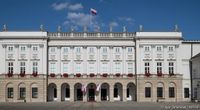Poland is bracing for an unprecedented interference campaign in its upcoming presidential elections, with officials warning of extensive Russian disinformation and cyberattacks aimed at destabilizing the electoral process. Digital Affairs Minister Krzysztof Gawkowski made these alarming assertions during a defense conference on May 6, just days before the first round of voting scheduled for May 18.
Gawkowski stated that Poland's strategic position as a hub for aid to Ukraine has rendered it a prime target for Russian sabotage efforts. He emphasized that the country is experiencing a surge in hybrid attacks on critical infrastructure, which include water utilities, heat and power plants, and public administration systems. “Today in Poland, during every minute of my speech, a dozen or so incidents targeting critical infrastructure were recorded,” he said, highlighting the severity of the situation.
The Russian cyber threat level in Poland has reportedly more than doubled compared to the previous year. This escalation in threats comes in the wake of a series of cyberattacks that have plagued Polish institutions, including the space agency and the state news agency. Prime Minister Donald Tusk has also pointed fingers at foreign actors for a cyberattack that targeted the IT systems of his Civic Platform party in April.
As Poland gears up for its elections, the atmosphere is charged with debates over pressing social policies, migration, and national security. The political landscape features a diverse array of candidates, including Warsaw Mayor Rafal Trzaskowski and leader of the Poland 2050 movement, Szymon Holownia. However, some candidates have come under scrutiny for their perceived connections to pro-Russian sentiments. For instance, far-right candidate Slawomir Mentzen is associated with nationalist circles that are skeptical of Poland's pro-Western stance. Meanwhile, Karol Nawrocki, who is backed by the ruling Law and Justice party, has faced criticism for remarks that some interpret as sympathetic to Russia.
Despite the accusations, Russia has consistently denied any involvement in foreign electoral interference. The Russian embassy in Warsaw responded to Gawkowski's claims by suggesting that he should provide evidence to support his assertions. This denial echoes the Kremlin's long-standing position on such allegations, which it categorically dismisses.
In addition to Poland, Moscow has been implicated in similar interference efforts in other countries, such as Romania, where allegations of cyberattacks and disinformation campaigns aimed at influencing the 2024 presidential election have surfaced. Reports indicate that Russia funded far-right candidate Calin Georgescu, further illustrating its strategy to exploit political divisions in neighboring nations.
Poland's heightened alertness to Russian interference is not without precedent. The country's involvement as a crucial ally to Ukraine since the onset of Russia's full-scale invasion in 2022 has placed it at the forefront of geopolitical tensions in Eastern Europe. As a result, Polish authorities have ramped up their defenses against potential cyber threats and disinformation campaigns.
With the election just around the corner, officials are urging vigilance among voters and institutions alike. The potential for Russian interference raises critical questions about the integrity of the electoral process and the broader implications for democracy in Poland. As Gawkowski noted, the stakes are high, and the need for robust defenses against such hybrid warfare is more pressing than ever.
As the nation prepares to cast its votes, the shadow of external interference looms large. The upcoming elections will not only determine Poland's immediate political future but could also influence the balance of power in the region amid ongoing tensions with Russia. The international community is watching closely, as the outcome in Poland could set a precedent for how democracies respond to foreign threats in an increasingly interconnected world.
In conclusion, Poland's presidential election is shaping up to be a critical test of its resilience against external pressures. With Russia's attempts to disrupt the electoral process now a focal point of concern, the nation must navigate these challenges while ensuring that the voices of its citizens are heard and respected.

